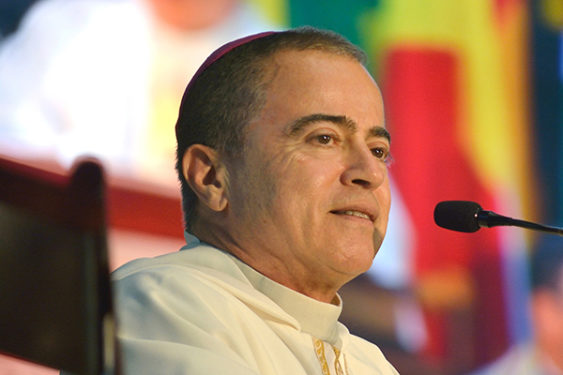
With the swearing-in of its third governor in two weeks, the island of Puerto Rico has now been tasked with learning to move forward in the aftermath of #RickyLeaks.
#RickyLeaks refers to the July 13 publication of 889 pages worth of text by the Puerto Rico Center for Investigative Journalism, in which then-governor Ricardo Rosselló mocked the island, Puerto Rican celebrities, and fellow politicians.
After the chat was leaked, Puerto Ricans around the world took to the streets for 12 straight days worth of protests to speak out against the governor’s rhetoric and call for his resignation.
“What pressured Governor Rosselló to step down was the result of a build-up of many years of frustration, difficulties, especially corruption within the government,” Archbishop Roberto Octavio González Nieves of San Juan told The Tablet.
“The government was out of touch with the real needs of the people, especially after Hurricane Maria,” he said, describing the leaked chats as the detonator that set off an explosion of frustration, anger and marches.
On July 19, the Puerto Rico Bishops’ Conference released a statement condemning Rosselló and echoing public urges for him to step down.
Co-signed by Archbishop Nieves, the statement claimed that principles of democratic governance “were torn apart by the Governor and his collaborators.” Met with the pressure to leave office, Rosselló announced his resignation as governor of Puerto Rico on July 24, effective August 2.
His administration at the time included Secretary of State of Puerto Rico Pedro Pierluisi, who assumed as governor from August 2 until the territory’s Supreme Court ruled determined his being sworn into office unconstitutional on August 7. As a result, the former Secretary of Justice, Wanda Vázquez, was instituted as governor immediately following Pierluisi’s resignation on that same day.
“Given the fact the 65 percent of the population is Catholic, that the majority of the people here are settling into this new reality and are generally supportive of her,” Archbishop Nieves said of Vázquez, who in her first month has already met with some of the island’s religious leaders.
“In all of our parishes, we’ve included petitions for this period of transition. We’ve been praying in all of our parishes and Christian churches, and synagogues here. Praying for a time of peace and stability in Puerto Rico,” he said.
“She has said some things that no previous governor here, I believe, has said. For example, the governorship doesn’t belong to a political party, but to the people of Puerto Rico. That statement has made waves,” he added.
“I dare say that there’s kind of a new Puerto Rico after these huge, huge protests. There’s kind of a new sense of freedom and a sense of the power of the people,” said Archbishop Nieves. “You can breathe it, and you can sense it in the air.”
